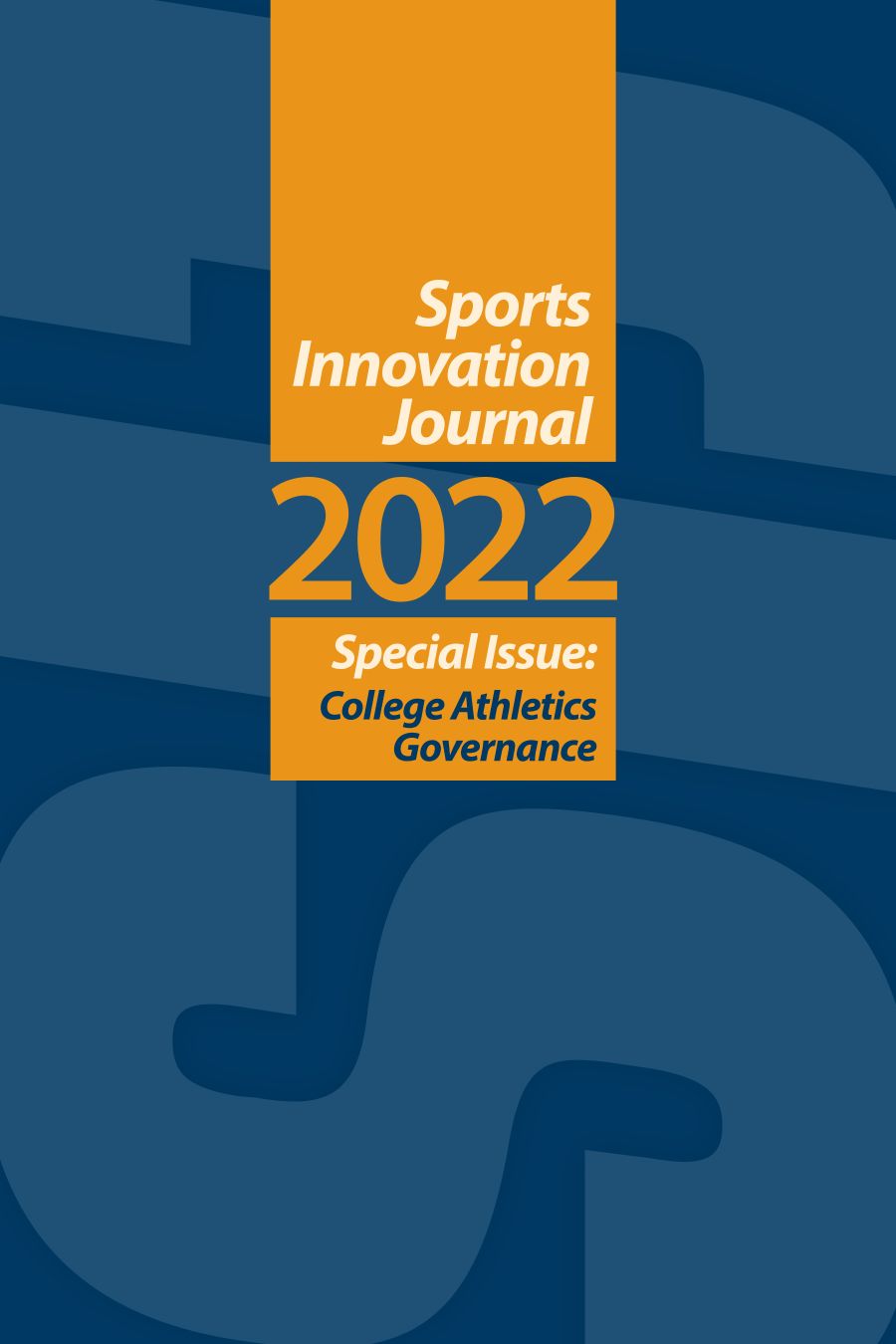Amateurism as a Narrative of Control
An Interdisciplinary Approach to the Lived Experiences of College Athlete
DOI:
https://doi.org/10.18060/26003Keywords:
qualitative research, amateurism, habitus, total institution, collaborationAbstract
The National Collegiate Athletic Association (NCAA) uses amateurism as a narrative to control college athletes, which affects how scholars conduct research with these athletes. This article speaks to issues that arise among qualitative researchers at different institutions when universities control access to athletes under the guise of the ‘amateurism’ narrative. Drawing on Bourdieu, we provide insight into the habitus of athletics departments through vignettes from each of the authors to highlight issues of access to the collegiate athlete population. We simultaneously speak against amateurism as a controlling narrative and argue that there is a need for more immersive research among college athletes to better understand athlete lived experiences within these institutions. From our different disciplinary perspectives, we offer three solutions to this issue that involve the integration of qualitative researchers and practitioners to inform programming that directly impacts the athletes on college campuses across the country.
References
Abruzzo, J.A. (2021, September 29). Statutory Rights of Players at Academic Institutions
(Student-Athletes) Under the National Labor Relations Act [Memorandum]. National Labor Relations Board. https://apps.nlrb.gov/link/document.aspx/09031d458356ec26
Bourdieu, P. (1984). Distinction. Routledge.
Branch, T. (2011, October). The Shame of College Sports. The Atlantic.
https://www.theatlantic.com/magazine/archive/2011/10/the-shame-of-college-sports/308643/
Byers, W., & Hammer, C. (1995). Unsportsmanlike Conduct: Exploiting College Athletes.
University of Michigan Press.
Clifford, J. (1996). Anthropology and/as Travel. Etnofoor, 9(2), 5–15.
https://www.jstor.org/stable/25757889
Foucault, M. (1977). Discipline and Punish: The Birth of the Prison. (Alan Sheridan, Trans.).
Random House.
Given, K. (2017, October 13). Walter Byers: The man who built the NCAA, then tried to tear it
down. WBUR. https://www.wbur.org/onlyagame/2017/10/13/walter-byers-ncaa
Goffman, Erwin. (1961). Asylums: Essays on the Social Situation of Mental Patients and
Other Inmates. Anchor Books.
Hatteberg, S. J. (2018). Under Surveillance: Collegiate Athletics as a Total Institution. Sociology
of Sport Journal, 35(2), 149-158. https://doi.org/10.1123/ssj.2017-0096
Kalman-Lamb, N., Silva, D. & Mellis, J. (2021a, December 1). How can colleges afford to pay
outlandish salaries to Lincoln Riley and other coaches? Los Angeles Times. https://www.latimes.com/opinion/story/2021-12-01/lincoln-riley-coach-salary-ncaa-athletes
Kalman-Lamb, N., Silva, D. & Mellis, J. (2021b, December 8). ‘This is a job’: Why college
players reject the insidious term ‘student athlete.’ The Guardian. https://www.theguardian.com/sport/2021/dec/08/this-is-a-job-why-college-players-reject-the-insidious-term-student-athlete
Messner, M. & Musto, M. (2014). Where are the Kids? Sociology of Sport Journal. 31(1),
-122. https://doi.org/10.1123/ssj.2013-0111
McGregror, A. (2021, December 20). The century-plus history fueling the college football
coaching carousel. Washington Post. https://www.washingtonpost.com/outlook/2021/12/20/century-plus-history-fueling-college-football-coaching-carousel/
National Collegiate Athletic Association. (2021a, August 1). “2021-22 NCAA Division I
Manual.” National Collegiate Athletic Association. https://web3.ncaa.org/lsdbi/reports/getReport/90008
National Collegiate Athletic Association. (2021b). NCAA Demographics Database.
https://www.ncaa.org/about/resources/research/ncaa-demographics-database
NCAA v. Alston, No. 20-512 (U.S. Jun. 21, 2021).
https://www.supremecourt.gov/opinions/20pdf/20-512_gfbh.pdf
Slothower, C. (2014, September 24). Fort Lewis’ first ‘student-athlete.’ The Durango Herald.
https://www.durangoherald.com/articles/fort-lewis-first-student-athlete/
Southall, R. M., & Weiler, J. D. (2014). NCAA Division-I Athletic Departments: 21st Century
Athletic Company Towns. Journal of Issues in Intercollegiate Athletics, 7, 161-186.
Starn, O. (2021, November 11). Duke University and the Troubles of College Sports. The
Assembly. https://www.theassemblync.com/short-form/duke-university-and-the-troubles-of-college-sports/
Staurowsky, E. J., & Sack, A. L. (2005). Reconsidering the use of the term student-athlete in
academic research. Journal of Sport Management, 19(2), 103-116.
https://doi.org/10.1123/jsm.19.2.103
The Daily Tar Heel Staff. (2020, August 9). The Daily Tar Heel will no longer use the term
‘student athlete.’ The Daily Tar Heel. https://www.dailytarheel.com/article/2020/08/student-athlete-term-editorial
Turner, R. (2018). Not For Long: The Life and Career of the NFL Athlete. Oxford
University Press.
Downloads
Published
Issue
Section
License
Copyright (c) 2022 Tracie Canada, Kaitlin Pericak, Miray D. Seward

This work is licensed under a Creative Commons Attribution 4.0 International License.
Copyright to articles published in Sport Innovation Journal is retained by the author(s).


